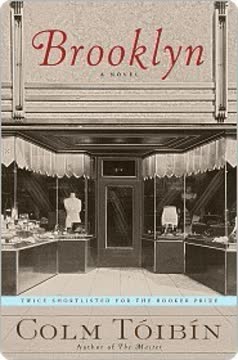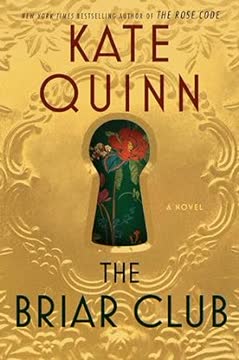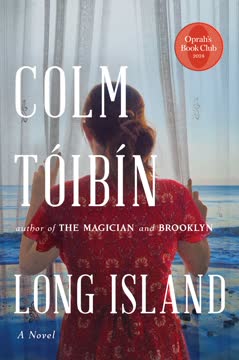Plot Summary
Enniscorthy's Quiet Beginnings
Eilis Lacey lives in the small Irish town of Enniscorthy with her widowed mother and glamorous older sister, Rose. The family is held together by Rose's job and the occasional remittances from Eilis's brothers in England. Eilis, intelligent and reserved, is finishing bookkeeping classes but finds no work in a town where jobs are scarce and social mobility is limited. The sisters' relationship is close, but Eilis feels overshadowed by Rose's confidence and beauty. The town's routines, gossip, and social hierarchies define Eilis's world, and her future seems predetermined: a job, marriage, and a life much like her mother's. Yet, beneath the surface, there is a sense of longing for something more, a quiet restlessness that sets the stage for change.
Rose's Sacrifice
Rose, recognizing Eilis's lack of prospects, arranges for her to emigrate to America with the help of Father Flood, a visiting priest from Brooklyn. Rose's actions are both loving and self-sacrificing; she gives up her own chance at marriage and independence to ensure Eilis has opportunities she never will. The family's preparations are bittersweet, filled with unspoken fears and sadness. Eilis is swept along by the momentum of others' decisions, unable to voice her own reluctance. The emotional cost of leaving home is profound, but Rose's determination and the family's economic reality make the choice inevitable. Eilis's departure is marked by a sense of duty, guilt, and the heavy weight of her sister's sacrifice.
Passage to America
Eilis's voyage across the Atlantic is physically and emotionally grueling. She endures seasickness, claustrophobia, and the indignities of third-class travel, sharing a cramped cabin with the brash but kind Georgina. The journey is a rite of passage, stripping Eilis of her old identity and forcing her to confront her vulnerability and isolation. Georgina's practical advice and camaraderie help Eilis survive, but the experience leaves her shaken. By the time she arrives in Brooklyn, Eilis is exhausted, disoriented, and acutely aware of her aloneness. The crossing marks the end of her childhood and the beginning of a new, uncertain chapter.
Brooklyn's Boarding House
Eilis moves into Mrs. Kehoe's boarding house, a microcosm of Irish Brooklyn, filled with young women navigating work, romance, and the expectations of their landlady. The house is governed by strict rules and subtle hierarchies, with Mrs. Kehoe's authority ever-present. Eilis struggles to fit in, feeling both invisible and scrutinized. The other boarders—Patty, Diana, Miss McAdam, and others—offer a mix of camaraderie, rivalry, and advice. The rituals of meals, laundry, and gossip provide structure but also highlight Eilis's outsider status. The boarding house becomes both a refuge and a prison, shaping her early experiences in America.
Homesickness and Survival
Eilis is overwhelmed by homesickness, loneliness, and the strangeness of her new life. The routines of her job at Bartocci's department store and her night classes at Brooklyn College offer distraction but little comfort. Letters from home are both a lifeline and a source of pain, reminding her of all she has lost. Eilis's grief is compounded by the realization that she is a ghost in Brooklyn, unseen and unanchored. A crisis at work exposes her vulnerability, but the intervention of Miss Fortini and Father Flood helps her regain her footing. Gradually, Eilis learns to manage her sadness, finding solace in routine and the slow accumulation of small victories.
The Shop Floor and Night School
Eilis becomes a reliable worker at Bartocci's, learning the intricacies of American retail and customer service. She is selected to help launch a new line of stockings for Black customers, navigating the racial tensions of 1950s Brooklyn. Night classes in bookkeeping and law at Brooklyn College challenge her intellectually and provide a sense of progress. Eilis's world expands as she gains skills, earns respect, and begins to imagine a future beyond the shop floor. The support of Miss Fortini and the discipline of study help her build a new identity, one rooted in competence and quiet ambition.
Christmas Among Strangers
Eilis spends her first Christmas in Brooklyn volunteering at Father Flood's parish hall, serving dinner to elderly Irish men who have been left behind by time and circumstance. The experience is both heartbreaking and illuminating, connecting her to the broader story of Irish emigration and loss. A moment of mistaken recognition—seeing her father in an old man—brings her grief to the surface. Yet, the day also offers a sense of belonging and purpose, as Eilis becomes part of a community of exiles. The holiday marks a turning point, as she begins to accept her new life and the necessity of forging connections in a foreign land.
Tony: An Unexpected Love
At a parish dance, Eilis meets Tony Fiorello, a warm, open-hearted Italian-American plumber. Their courtship is marked by shyness, humor, and the crossing of cultural boundaries. Tony's affection and optimism draw Eilis out of her shell, offering her a vision of happiness and stability. His family welcomes her, and their outings—to Coney Island, baseball games, and family dinners—introduce her to the rhythms of American life. Eilis is cautious, aware of the differences between them and the expectations of her family back home. Yet, Tony's sincerity and the comfort of their growing intimacy help her imagine a future in Brooklyn.
Becoming American
Eilis's relationship with Tony deepens, and she gradually becomes more American in her habits, tastes, and outlook. She navigates the complexities of intimacy, guilt, and confession, ultimately consummating her relationship with Tony in a moment of shared vulnerability after Rose's death. The experience is both awkward and transformative, marking her passage into adulthood. Eilis's success at work and school, her friendships, and her romance with Tony all contribute to a sense of belonging. She is no longer a ghost but a woman with agency, desires, and a stake in her adopted home.
Letters from Home
Throughout her time in Brooklyn, Eilis remains tethered to Ireland by letters from her mother, Rose, and her brothers. The correspondence is both comforting and constraining, filled with news, expectations, and unspoken needs. Rose's letters, in particular, are a lifeline, offering advice, encouragement, and a sense of continuity. Yet, the distance grows, and Eilis becomes increasingly aware of the impossibility of bridging the gap between her two worlds. The letters become a symbol of divided loyalties and the emotional cost of emigration.
Rose's Death
News of Rose's sudden death arrives, plunging Eilis into grief and guilt. The loss is devastating, not only because of her love for her sister but because Rose was the architect of her new life. Eilis is forced to confront the reality that she can never return to the world she left behind. Her mother's loneliness and the family's disintegration weigh heavily on her. In her grief, Eilis turns to Tony, and they marry in secret before she returns to Ireland to care for her mother. The marriage is both an act of love and a desperate attempt to anchor herself amid loss.
Marriage in Secret
Fearing that she will be unable to return to Brooklyn if she stays in Ireland too long, Eilis agrees to marry Tony in a civil ceremony before her departure. The marriage is secret, uncelebrated, and fraught with anxiety. Eilis is torn between her duty to her mother and her commitment to Tony. The clandestine nature of the wedding underscores her divided self and the impossibility of reconciling her two lives. The act is both a promise and a burden, shaping the choices she will face upon her return to Ireland.
Return to Ireland
Eilis's return to Enniscorthy is marked by grief, nostalgia, and a sense of unreality. She moves into Rose's room, helps her mother with the rituals of mourning, and is drawn back into the rhythms of small-town life. The town's familiarity is both comforting and suffocating. Eilis is celebrated for her American style and success, and she is offered work at Davis's office. The prospect of a stable, respectable life in Ireland becomes increasingly seductive, especially as her mother's dependence and the community's expectations close in around her.
Ghosts of the Past
Eilis reconnects with old friends, attends weddings, and is courted by Jim Farrell, a local publican. Jim is kind, steady, and well-regarded—a match that would please her mother and secure her place in the community. The ease of their relationship, the approval of her mother, and the prospect of a comfortable life in Enniscorthy tempt Eilis to forget her American self. Yet, the ghost of her marriage to Tony haunts her, and the duplicity of her situation becomes increasingly untenable.
The Pull of Home
As Eilis becomes more enmeshed in Irish life, the pull of home grows stronger. She is offered a permanent job, her mother's hopes for her future intensify, and the town's social fabric enfolds her. The possibility of erasing her American life and starting anew with Jim becomes real. Eilis is caught between two worlds, each demanding loyalty and offering different forms of fulfillment. The tension between duty, desire, and the longing for belonging reaches its peak.
Jim Farrell's Courtship
Jim's courtship is gentle, respectful, and supported by the community. He represents everything Eilis once thought she wanted: stability, respectability, and a place in the world she knows. Their relationship deepens, and the prospect of marriage becomes real. Eilis is torn between her secret marriage to Tony and the life she could have with Jim. The duplicity becomes unbearable, and the need to choose becomes urgent.
Miss Kelly's Revelation
Miss Kelly, the town's sharp-tongued shopkeeper, reveals that she knows about Eilis's marriage to Tony, having heard from Mrs. Kehoe in Brooklyn. The threat of exposure forces Eilis to confront the reality of her situation. The web of secrets, lies, and divided loyalties unravels. Eilis is faced with the impossibility of living two lives and the necessity of making a definitive choice.
Choosing a Future
Eilis confesses her marriage to her mother and prepares to return to Brooklyn. The farewell is painful, marked by regret, love, and the recognition that every choice comes with loss. Eilis leaves a note for Jim, unable to face him, and boards the train for her journey back to America. The novel ends with Eilis's acceptance of her fate: she cannot have both worlds, and the cost of emigration is the permanent division of the self. Her future is uncertain, but she moves forward with resolve, carrying the weight of her choices and the memory of all she has left behind.
Characters
Eilis Lacey
Eilis is a young Irish woman whose life is shaped by the expectations of family, community, and circumstance. She is intelligent, sensitive, and reserved, often swept along by the decisions of others. Eilis's journey is one of self-discovery, marked by homesickness, adaptation, and the gradual assertion of agency. Her psychological complexity lies in her passivity, her longing for belonging, and her struggle to reconcile competing loyalties. Eilis's development is subtle: she moves from being a ghost in her own life to a woman capable of making painful, definitive choices. Her relationships—with Rose, Tony, her mother, and Jim—reveal her capacity for love, guilt, and sacrifice. Ultimately, Eilis embodies the emigrant's dilemma: the impossibility of returning home unchanged and the cost of forging a new identity.
Rose Lacey
Rose is the linchpin of the Lacey family, supporting her mother and siblings with grace and determination. She is elegant, ambitious, and outwardly confident, but her actions are driven by love and a deep sense of duty. Rose orchestrates Eilis's emigration, sacrificing her own prospects for her sister's future. Her death is a turning point, exposing the fragility of the family and the depth of her unspoken sacrifices. Rose's presence lingers throughout the novel, shaping Eilis's choices and haunting her with the memory of all that has been lost.
Mrs. Lacey
Mrs. Lacey is a widow whose life revolves around her children and the maintenance of respectability. She is practical, stoic, and emotionally guarded, relying on Rose and then Eilis for companionship and support. Her grief at Rose's death and Eilis's emigration is profound but largely unspoken. Mrs. Lacey's psychological complexity lies in her ability to both demand and relinquish control, her pride masking vulnerability. Her relationship with Eilis is marked by love, disappointment, and the pain of inevitable separation.
Tony Fiorello
Tony is Eilis's first real love, a plumber from a large, affectionate Italian family in Brooklyn. He is open, humorous, and deeply devoted, offering Eilis a vision of happiness and stability. Tony's sincerity and vulnerability contrast with Eilis's reserve, drawing her out of her shell. His dreams of a future together—children, a house on Long Island—are both comforting and constraining. Tony's psychological depth emerges in his fear of losing Eilis and his willingness to bind her to him through marriage. He represents the promise and the limitations of the American dream.
Jim Farrell
Jim is a publican in Enniscorthy, well-liked and considered a "catch" by the community. He is kind, reliable, and somewhat reserved, embodying the virtues of small-town respectability. Jim's courtship of Eilis is gentle and sincere, offering her the possibility of a life rooted in familiarity and tradition. His psychological complexity lies in his vulnerability, his longing for connection, and his inability to imagine a world beyond Enniscorthy. Jim is both a temptation and a reminder of all that Eilis has left behind.
Miss Kelly
Miss Kelly is a figure of authority and menace in Enniscorthy, wielding gossip and social power with precision. She employs Eilis briefly and later exposes her secret, acting as a catalyst for Eilis's final decision. Miss Kelly embodies the small-town surveillance and judgment that Eilis both fears and resents. Her psychological depth lies in her need for control and her enjoyment of others' discomfort.
Mrs. Kehoe
Mrs. Kehoe runs the Brooklyn boarding house with a mix of strictness and maternal concern. She is a gatekeeper to the Irish immigrant community, enforcing rules and mediating conflicts among her boarders. Mrs. Kehoe's relationship with Eilis evolves from suspicion to affection, and her actions—both helpful and meddling—shape Eilis's experience in America. She represents the complexities of immigrant solidarity and the persistence of old-world values in a new context.
Father Flood
Father Flood is the architect of Eilis's emigration, using his connections to secure her passage, job, and education. He is kind, practical, and attuned to the needs of his parishioners, but he also exerts subtle pressure on Eilis to conform to expectations. Father Flood's psychological complexity lies in his blend of compassion and control, his ability to both comfort and direct. He is a symbol of the Church's role in shaping immigrant destinies.
Patty and Diana
Patty and Diana are Eilis's friends in the boarding house, offering advice, companionship, and a window into American youth culture. They are ambitious, fashion-conscious, and eager to embrace new experiences. Their friendship helps Eilis adapt and provides comic relief amid the novel's heavier themes. They represent the possibilities and challenges of female solidarity in a changing world.
Miss Fortini
Miss Fortini is Eilis's supervisor at Bartocci's, guiding her through the challenges of retail work and cultural adaptation. She is intelligent, assertive, and supportive, encouraging Eilis to pursue education and self-improvement. Miss Fortini's psychological depth lies in her blend of toughness and empathy, her ability to navigate the complexities of gender, race, and ambition in 1950s America.
Plot Devices
Emigration as Rite of Passage
The novel uses emigration as both a literal and metaphorical journey, marking the end of childhood and the beginning of adult selfhood. The physical crossing of the Atlantic is mirrored by Eilis's psychological passage from dependence to agency. The device foregrounds themes of displacement, identity, and the irreversibility of change. The cost of emigration is not only separation from home but the permanent division of the self, a motif that recurs throughout the narrative.
Letters as Emotional Bridge and Barrier
Letters between Eilis and her family serve as a lifeline, maintaining connections across distance. They are a source of comfort, guilt, and misunderstanding, shaping Eilis's sense of obligation and belonging. The device highlights the limitations of communication and the persistence of longing. Letters also function as a plot mechanism, delivering news (Rose's death) and prompting action (Eilis's return).
Doubling and Divided Selves
Eilis's experiences in Ireland and America are structured as parallel but incompatible lives. The device of doubling—two suitors, two homes, two selves—underscores the central tension of the novel: the impossibility of reconciling past and present, duty and desire. The narrative structure, with its mirrored episodes (work, romance, family), emphasizes the theme of irretrievable loss and the necessity of choice.
Foreshadowing and Irony
The novel employs subtle foreshadowing—Rose's secret illness, Eilis's reluctance to leave, Tony's fear of abandonment—to build tension and prepare the reader for the inevitable crisis. Irony pervades the narrative: the very opportunities that promise freedom become sources of entrapment; the sacrifices made for Eilis's future bind her to a fate she cannot escape. The interplay of foreshadowing and irony deepens the psychological complexity and emotional resonance of the story.
Analysis
Colm Tóibín's Brooklyn is a masterful exploration of emigration, identity, and the quiet devastations of choice. Through Eilis Lacey's journey from small-town Ireland to the immigrant neighborhoods of Brooklyn, the novel examines the emotional costs of leaving home and the impossibility of returning unchanged. Tóibín's understated prose and psychological acuity reveal the ways in which duty, love, and longing shape—and sometimes paralyze—his characters. The novel's power lies in its attention to the ordinary: the rituals of family, the routines of work, the slow accumulation of small decisions that ultimately define a life. Brooklyn is a story about the search for belonging in a world where every gain is shadowed by loss, and every act of self-assertion comes at the price of another's sacrifice. In the end, Eilis's choice is less about romance than about the acceptance of adulthood's irreconcilable demands. The novel's lesson is both simple and profound: there is no way back, only the courage to move forward, carrying the weight of all we leave behind.
Last updated:
FAQ
```markdown
Synopsis & Basic Details
What is Brooklyn about?
- A Young Woman's Odyssey: Brooklyn follows Eilis Lacey, a quiet young woman from 1950s Enniscorthy, Ireland, as she emigrates to Brooklyn, New York, seeking opportunities unavailable in her small hometown. The narrative charts her profound journey of adaptation, from crippling homesickness and cultural disorientation to finding love, a career, and a new sense of self in America.
- Navigating Two Worlds: The story explores Eilis's struggle to reconcile her Irish roots with her burgeoning American identity. She builds a new life, falls in love with an Italian-American man, Tony, and gains independence, only to be called back to Ireland by a family tragedy, forcing her to confront the powerful pull of home and the life she left behind.
- The Emigrant's Dilemma: Ultimately, Brooklyn is a poignant exploration of the irreversible nature of emigration and the profound choices it demands. Eilis finds herself caught between two lives, two loves, and two versions of herself, culminating in a decisive moment that underscores the sacrifices inherent in forging a new destiny.
Why should I read Brooklyn?
- Deep Emotional Resonance: Readers should delve into Brooklyn for its exquisite portrayal of human emotion, particularly homesickness, grief, and the quiet joy of new love. Colm Tóibín's understated prose allows Eilis's internal world to unfold with remarkable depth, making her struggles and triumphs deeply relatable.
- Masterful Character Development: The novel offers a nuanced study of Eilis's transformation from a passive, dutiful daughter to a woman of quiet strength and agency. Her journey, alongside richly drawn supporting characters like the pragmatic Father Flood and the vivacious Tony, provides a compelling exploration of identity formation and the impact of environment.
- Timeless Themes Explored: Brooklyn delves into universal themes such as emigration as a rite of passage, the search for belonging, the complexities of family duty, and the bittersweet nature of choice. Its historical setting in the 1950s adds a layer of cultural context to these enduring human experiences, offering a powerful analysis of the immigrant experience.
What is the background of Brooklyn?
- Post-War Irish Emigration: The novel is set against the backdrop of widespread Irish emigration in the 1950s, a period when economic hardship and limited opportunities drove many young people, particularly women, to seek new lives abroad, primarily in England and America. This historical context highlights the societal pressures and personal sacrifices inherent in Eilis's journey.
- Cultural Clash in 1950s America: Brooklyn vividly portrays the cultural landscape of mid-20th century America, particularly the vibrant, multi-ethnic immigrant communities of Brooklyn. Eilis's encounters with Italian-American culture, the burgeoning civil rights movement (through the nylon stocking scene), and the distinct American social norms underscore the significant cultural shifts she experiences.
- Enniscorthy's Stifling Atmosphere: The depiction of Enniscorthy, Tóibín's own hometown, is crucial to understanding Eilis's initial motivations. It represents a world of limited prospects, strict social expectations, and pervasive gossip, contrasting sharply with the perceived freedom and anonymity of Brooklyn. This geographical and cultural contrast is central to the novel's themes.
What are the most memorable quotes in Brooklyn?
- "She was nobody here. It was not just that she had no friends and family; it was rather that she was a ghost in this room, in the streets on the way to work, on the shop floor.": This quote powerfully encapsulates Eilis's initial profound homesickness and sense of displacement in Brooklyn, highlighting the theme of identity loss and the struggle for belonging in a new land. It marks a critical psychological turning point in her Brooklyn analysis.
- "Time and patience would bring a snail to America.": Jack's seemingly simple, almost folksy, saying to Eilis on the docks of Liverpool carries a deeper symbolic weight, foreshadowing the slow, arduous, but ultimately transformative journey Eilis undertakes. It speaks to the enduring Irish spirit of perseverance in the face of immense change, a key theme in Brooklyn.
- "If you are married, you should be with your husband.": Uttered by Eilis's mother at the novel's climax, this line is a stark, unyielding statement of duty and moral clarity. It cuts through Eilis's indecision and forces her to confront the consequences of her secret marriage, serving as the ultimate catalyst for her final choice and revealing deep Eilis Lacey motivations.
What writing style, narrative choices, and literary techniques does Colm Tóibín use?
- Understated, Lyrical Prose: Tóibín employs a minimalist and precise prose style, characterized by its clarity and emotional restraint. He often uses simple, declarative sentences that build a cumulative emotional impact, allowing the reader to infer much from what is not explicitly stated, which is central to the Brooklyn analysis of its emotional depth.
- Third-Person Limited Omniscient POV: The narrative is primarily told from Eilis's perspective, offering intimate access to her thoughts and feelings, yet maintaining a slight distance. This choice emphasizes her internal struggles and passive nature, allowing readers to experience her journey of self-discovery alongside her, making her psychological complexities palpable.
- Subtle Foreshadowing and Symbolism: Tóibín masterfully uses subtle hints and recurring motifs, such as the contrasting "warmth" of American homes versus Irish cold, or the significance of clothing and appearance, to foreshadow events and deepen thematic resonance. This technique enriches the symbolism in Brooklyn, inviting readers to uncover hidden meanings beneath the surface plot.
Hidden Details & Subtle Connections
What are some minor details that add significant meaning?
- Miss Kelly's Stale Bread: Miss Kelly's repeated offering of stale bread to Eilis's mother, which Mrs. Lacey then uses for breadcrumbs, subtly highlights the class distinctions and Miss Kelly's condescending view of the Laceys. It underscores the economic desperation that drives Eilis's emigration and the quiet indignities faced by the less fortunate in Enniscorthy, a detail often missed in a superficial Brooklyn analysis.
- The "Courtnacuddy Bus" Joke: When Nancy and Eilis are at the Athenaeum, Nancy jokes, "You could be called the Courtnacuddy Bus." This seemingly throwaway line reveals the pervasive small-town gossip and the social pressure on young women to find partners, hinting at the stifling atmosphere Eilis seeks to escape and the judgment she fears, influencing Eilis Lacey motivations.
- American Heating vs. Irish Cold: Eilis's delight in the constant heating in American homes, a stark contrast to the cold Irish houses, is a minor detail that symbolizes her growing comfort and assimilation into American life. It represents a tangible, physical manifestation of the "better life" she finds, a subtle but powerful symbolism in Brooklyn of her new home's appeal.
What are some subtle foreshadowing and callbacks?
- Rose's Unspoken Illness: The existing analysis mentions Rose's secret illness, but the subtle hints are crucial. Her "nervous laughter" when Father Flood mentions her uncle "Hatchethead" (Part One), and her mother's later revelation that Rose had been seeing a doctor for her heart "without telling anyone," foreshadow the suddenness of her death and underscore her self-sacrificing nature, adding depth to Rose Lacey motivations.
- Jack's Initial Homesickness: Jack's confession to Eilis on the boat, "In the first few months I couldn't find my way around at all and I was desperate to go home," subtly foreshadows Eilis's own intense period of homesickness. It's a callback to the universal immigrant experience, showing that even her seemingly confident brothers faced similar struggles, connecting to themes in Brooklyn of displacement.
- Mrs. Kehoe's "Best Room" Secrecy: Mrs. Kehoe's secretive manner when offering Eilis Miss Keegan's basement room, insisting it's the "best room" while simultaneously swearing Eilis to silence, foreshadows the underlying tension and potential danger (the man who exposed himself) associated with the room. It also subtly reveals Mrs. Kehoe's manipulative side, a deeper insight into Mrs. Kehoe's character analysis.
What are some unexpected character connections?
- Miss Kelly and Mrs. Kehoe's Kinship: The revelation that Miss Kelly and Mrs. Kehoe are first cousins is a surprising and significant connection. It highlights the interconnectedness of the Irish diaspora and the long reach of small-town gossip, demonstrating how Eilis's two worlds are not as separate as she believes. This familial link becomes the ultimate catalyst for Eilis's forced decision, a crucial Brooklyn analysis point.
- Father Flood's Enniscorthy Accent: When Father Flood drops his American accent and speaks in "pure Enniscorthy" to Eilis, it's an unexpected moment of connection. It reveals his own enduring ties to home and his understanding of Eilis's homesickness, creating a bond that transcends his formal role and offers a glimpse into his Father Flood motivations beyond mere benevolence.
- Tony's "Irish" Persona: Tony's initial lie to Mrs. Kehoe about being "Tony McGrath" and his presence at an Irish dance, despite being Italian, reveals his eagerness to connect with Eilis and assimilate into her world. This subtle deception, later confessed, highlights his genuine affection and willingness to bridge cultural divides, offering a fresh perspective on Tony Fiorello's character analysis.
Who are the most significant supporting characters?
- Georgina, the Shipboard Mentor: Georgina, Eilis's cabin mate on the transatlantic voyage, is more than just a temporary companion. Her brashness, practical advice ("Don't look too innocent," "Don't look too frightened"), and make-up tutorial are crucial in preparing Eilis for the realities of America, acting as a vital, albeit brief, guide in her emigration as rite of passage.
- Miss Fortini, the Professional Confidante: Eilis's supervisor at Bartocci's evolves from a strict boss to a mentor and confidante. Her advice on work, fashion, and even relationships (her own Italian boyfriend struggles) provides Eilis with a model of American female independence and professionalism, offering a nuanced Miss Fortini character analysis and contributing to Eilis's assimilation.
- Frank Fiorello, the Innocent Observer: Tony's youngest brother, Frank, with his unfiltered comments and keen observations, serves as a barometer for Eilis's integration into the Fiorello family. His initial hostility towards "Irish people" and later acceptance of Eilis, along with his desire for his own room in Long Island, subtly reflects the family's hopes and fears, adding depth to the Fiorello family dynamics.
Psychological, Emotional, & Relational Analysis
What are some unspoken motivations of the characters?
- Rose's Self-Sacrifice for Eilis's Freedom: While the summary notes Rose's sacrifice, the unspoken motivation is her profound understanding of Eilis's potential and the limitations of Enniscorthy. Rose, despite her glamour, likely felt trapped by her own circumstances and saw Eilis as her chance for vicarious escape, making her actions a complex blend of love and a desire for Eilis to achieve what she couldn't. This is a key aspect of Rose Lacey motivations.
- Mrs. Lacey's Quiet Manipulation: Eilis's mother, though seemingly passive, subtly orchestrates Eilis's return and attempts to keep her in Ireland. Her "undisguised satisfaction" when it rains, ensuring Jim Farrell drives them to the wedding, and her "conspiratorial" tone about Eilis staying longer, reveal a deep, unspoken desire to retain her last daughter, highlighting the Mrs. Lacey character analysis beyond simple grief.
- Tony's Fear of Abandonment: Tony's insistence on a secret marriage before Eilis returns to Ireland stems from an unspoken fear of losing her, amplified by his understanding of the pull of home. His emotional vulnerability, expressed through tears and the desperate plea "Because if we don't do it, I'm going to go crazy," reveals a deeper insecurity beneath his cheerful exterior, crucial for Tony Fiorello's motivations.
What psychological complexities do the characters exhibit?
- Eilis's Divided Self: Eilis grapples with a profound psychological split, feeling like "two people" – the Brooklyn Eilis who is independent and in love, and the Enniscorthy Eilis, her mother's dutiful daughter. This internal conflict, a core theme in Brooklyn, manifests in her inability to speak her truth, her emotional paralysis, and her constant negotiation between duty and desire.
- Mrs. Kehoe's Masked Vulnerability: Beneath Mrs. Kehoe's pragmatic and controlling exterior lies a hidden vulnerability, hinted at by the "sadness" Eilis perceives when Mrs. Kehoe gives her the "best room." This room, possibly her former marital bedroom, suggests a past loss (Mr. Kehoe leaving with their money) that informs her need for control and her complex maternal feelings towards Eilis, adding layers to Mrs. Kehoe's character analysis.
- Jim Farrell's Hidden Insecurities: Jim, initially presented as a confident "catch," reveals deep insecurities about his social standing and ability to connect with people, especially women. His confession, "I was never good at making friends. I always felt that people didn't like me," exposes a psychological complexity that makes his courtship of Eilis more poignant and his eventual hurt more understandable, enriching Jim Farrell's motivations.
What are the major emotional turning points?
- The First Wave of Homesickness: Eilis's intense, almost physical, homesickness after receiving letters from home (Part Two) is a critical emotional turning point. It's described as a "terrible weight" and a feeling "like how she felt when her father died," signifying the profound emotional cost of her emigration and the initial struggle for survival in Brooklyn, a key moment in Eilis Lacey's emotional analysis.
- Rose's Death and Eilis's Guilt: The news of Rose's sudden death (Part Three) is a devastating emotional blow, not just due to grief but also the crushing weight of guilt. Eilis's repeated lament, "Why did I ever come over here?", reveals her belief that her absence contributed to Rose's secret suffering, profoundly shaping her subsequent actions and her divided loyalties.
- The Secret Marriage's Burden: Eilis's decision to secretly marry Tony (Part Three) is an emotional turning point driven by fear and a desperate need for an anchor. While an act of love, it immediately becomes a "burden," creating a profound sense of duplicity that isolates her and complicates her return to Ireland, highlighting the psychological complexities of her choices.
How do relationship dynamics evolve?
- Eilis and Rose: From Shadow to Sacrifice: Initially, Eilis feels overshadowed by Rose's glamour and confidence. However, Rose's orchestration of Eilis's emigration and her hidden illness reveal a deep, self-sacrificing love. Rose's death transforms their dynamic into one of enduring influence and profound guilt for Eilis, making Rose a constant, albeit absent, presence in Eilis's decisions, central to Eilis Lacey's relationships.
- Eilis and Tony: From Awkwardness to Intimacy: Their relationship evolves from shy, culturally awkward encounters at parish dances to deep intimacy and a shared future vision. Tony's consistent warmth, patience, and vulnerability gradually break down Eilis's reserve, fostering a bond built on mutual affection and a sense of belonging, offering a detailed Tony Fiorello relationship analysis.
- Eilis and Mrs. Lacey: From Dependence to Distance: Eilis's relationship with her mother shifts from childhood dependence to a complex dynamic of unspoken expectations and emotional distance. Mrs. Lacey's grief and subtle attempts to keep Eilis in Ireland highlight the generational divide and the irreversible impact of emigration, underscoring the themes in Brooklyn of family and separation.
Interpretation & Debate
Which parts of the story remain ambiguous or open-ended?
- Eilis's True Feelings for Tony: While Eilis marries Tony and expresses love, the depth and nature of her feelings for him, especially compared to her growing affection for Jim, remain ambiguous. Her internal monologue, "she was sure that she did not love Tony now," just before her final decision, leaves readers to debate whether her return is out of love, duty, or a pragmatic acceptance of her choices, a key point in Eilis Lacey's motivations analysis.
- The Extent of Mrs. Lacey's Knowledge: It's unclear how much Eilis's mother truly knows or suspects about Eilis's life in Brooklyn, particularly her relationship with Tony. Her quiet observations and pointed remarks ("If you are married, you should be with your husband") suggest a deeper understanding than she lets on, leaving readers to interpret her role as either subtly manipulative or profoundly intuitive, adding to the Mrs. Lacey character analysis.
- The Future of Eilis's Identity: The novel concludes with Eilis returning to Brooklyn, but her internal conflict between her Irish and American selves is far from resolved. The ending leaves open the question of whether she will fully embrace her American identity, or if the "strange, hazy dream" of her time in Ireland will continue to haunt her, a central debate in themes in Brooklyn and Brooklyn ending explained.
What are some debatable, controversial scenes or moments in Brooklyn?
- The Bathing Suit Fitting with Miss Fortini: The scene where Miss Fortini helps Eilis choose a bathing suit, touching her body and offering intimate advice on shaving, can be interpreted in various ways. Some readers might see it as a supportive, maternal gesture of female mentorship and assimilation, while others might find it uncomfortably intrusive or even subtly sexual, sparking debate on Miss Fortini's character analysis and cultural norms.
- The Speed of Eilis and Tony's Marriage: The decision for Eilis and Tony to marry in secret and so quickly after Rose's death, and before Eilis's return to Ireland, is highly debatable. Was it a genuine act of love and commitment, or a desperate, impulsive decision driven by Tony's fear of loss and Eilis's need for an anchor amidst grief? This moment is crucial for understanding Tony Fiorello's motivations and Eilis Lacey's psychological complexities.
- Miss Kelly's Revelation as Betrayal or Catalyst: Miss Kelly's deliberate revelation of Eilis's secret marriage to Mrs. Byrne, knowing it would reach Eilis's mother, is a controversial act. While it forces Eilis to confront her duplicity, it can be seen as a malicious betrayal of trust, or, conversely, as a necessary, albeit harsh, catalyst for Eilis to make a definitive choice and embrace her adult responsibilities, a key point in Miss Kelly's character analysis.
Brooklyn Ending Explained: How It Ends & What It Means
- A Forced, Yet Liberating, Choice: The novel concludes with Eilis confessing her secret marriage to her mother and returning to Brooklyn, leaving a note for Jim Farrell. This ending signifies that Eilis's choice is not entirely her own, but rather forced by Miss Kelly's revelation. However, it is also a liberation from the suffocating duplicity and the expectations of Enniscorthy, allowing her to finally commit to her new life, a core aspect of the Brooklyn ending explained.
- The Irreversible Cost of Emigration: Eilis's final journey back to America, marked by her mother's stoic farewell and her inability to face [Jim](#
Review Summary
Brooklyn tells the story of Eilis Lacey, a young Irish woman who immigrates to 1950s New York. The novel explores themes of identity, belonging, and the immigrant experience. Reviews are mixed, with some praising Tóibín's character development and nuanced portrayal of Eilis's journey, while others found the protagonist passive and the plot lacking. Many readers appreciated the book's quiet, introspective tone and its depiction of the challenges faced by immigrants. The ending divided opinions, with some finding it poignant and others unsatisfying.
Similar Books
Download PDF
Download EPUB
.epub digital book format is ideal for reading ebooks on phones, tablets, and e-readers.
















